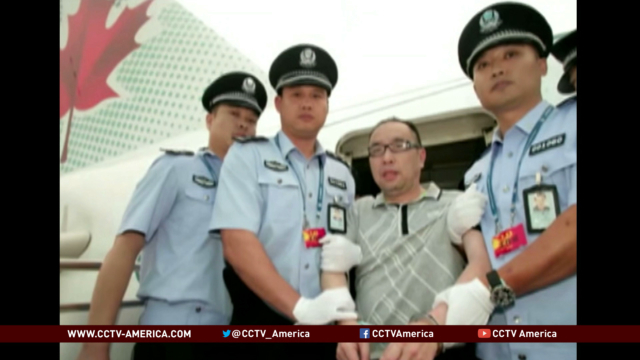China will push to build up a regional network to prevent the flight of corrupt officials and illegal funds at next week’s Asia-Pacific Economic Cooperation meetings in Beijing. CCTV America’s Han Bin reported this story.

At APEC, an international forum among Asia-Pacific countries to discuss economic growth, cooperation, and trade, China will propose more information sharing among member countries by upgrading the APEC Network of Anti-Corruption Authorities and Law Enforcement Agencies, or ACT-NET.
“Many countries have found that illegal money usually went through underground economies, which created more crimes. So, the attitudes in dealing with fugitives and their illegal money have been drastically changed. There’s been a high consensus among APEC members to expand cross-border cooperation to bring more transparency and fairness to the global economy,” said Cheng Wenhao, a Tsinghua University professor.
The network is expected to be endorsed as part of the APEC leaders’ declaration. In addition to deterring corruption, it could help nurture good governance and sustain economic growth.
Corrupt officials from China have often fled abroad, taking their assets with them. Top destinations include Australia, the United States, and Canada, where they can easily get residency and transfer funds without fear of prosecution. The lack of an extradition treaty between these countries and China also hinders prosecution.
China and Australia have recently partnered to fight corruption by seizing assets of corrupt Chinese officials in Australia. Part of China’s “Operation Fox Hunt” campaign, the Chinese Ministry of Public Security worked to return fugitive officials to China and face justice.
“Both countries are signatory states of the UN Anti-corruption Convention. They have obligations on law enforcement. Although they have no extradition treaty, they can still cooperate within the framework of a higher international law,” professor Cheng said.
China has also been seeking bilateral judicial assistance with other countries by signing agreements on judicial assistance, extradition, and the transfer of convicted people with 63 countries, added Hua Chunying, spokesperson for the Chinese Foreign Ministry.
Young people gather in Beijing to learn more about APEC
Nearly 60 youth delegates from 21 APEC member economies have gathered in Beijing for 2014 APEC Youth Week from Nov. 3-9, to discuss a variety of topics concerning sustainable development in the Asia-Pacific region. CCTV America’s Shi Wenjing reported this story.
“As the future generation of APEC leaders, it is important to invite young minds to help formulate vision for the next 25 years,” said Dr Alan Bollard, executive director of the APEC Secretariat.
Chief executives from Fortune 500 and Chinese companies have been invited to give speeches and discuss a variety of topics such as innovation, business start-ups and youth leadership.
At the project’s end, youth leaders will submit policy recommendations to APEC leaders, representing views of the younger generation to be delivered to the APEC Senior Officials Meeting.
The main goal of youth week is to reinforce APEC’s understanding and influence on youth and to create opportunity for students to have face-to-face interaction with statesmen and entrepreneurs.

Beijing shuts down constructions projects to check air-pollution during APEC meeting.
As part of the preparation work for the Asia Pacif Economic Cooperation meetings, Beijing is taking measures to clear the sky. CCTV America’s Ning Hong reports from Beijing.

 CGTN America
CGTN America
